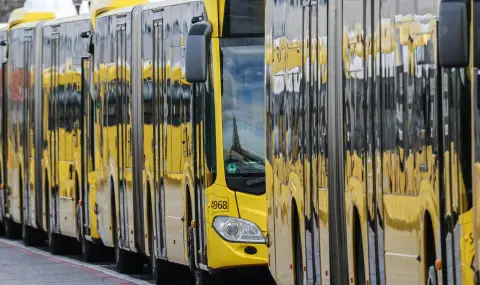It is still dark outside when Messi Hazard gets behind the wheel. The 31-year-old is a bus driver in the German city of Wiesbaden and is responsible for the transportation and safety of hundreds of passengers every day. He still remembers the shock of two years ago, when a car suddenly swerved under the nose of the bus and only a sharp stop prevented a serious accident. Many people then suffered minor injuries.
Hazar loves his profession, but he keeps repeating to himself that mistakes in it are not allowed, because they are punished severely - including with human life, writes ARD.
Shortage of tens of thousands of drivers
And this is not the only factor that makes the profession of a public transport driver unattractive. The German media cite various reasons that are driving older drivers in particular to give up the profession. These include the grueling early morning and late evening shifts, working weekends and holidays, the relatively low pay, the enormous psychological pressure to keep to the schedule, and the increasing number of conflicts with passengers. At the same time, young drivers are finding it increasingly difficult.
The German public media summarizes that public urban transport in Germany is facing enormous challenges. According to the Federal Association of Bus Operators (BDO), the country is currently short of nearly 20,000 bus drivers, which is leading to a reduction in routes in a total of 65% of companies. The association's forecasts are that if no measures are taken, by 2030 there will be a shortage of nearly 65,000 drivers.
Average gross salary of around 3,200 euros
The data cited by ARD also show another trend: the age of public transport drivers is progressively increasing. Nearly 57% of bus and tram drivers are over 55, and between 4,000 and 6,000 of them retire each year. According to trade unionists, it is extremely necessary to improve working conditions in the profession so that it can become more attractive to young people. Azar, for example, wishes he had more days off and that his work would be more recognized.
The current situation is such that he is regularly forced to compensate for bus delays at the expense of his breaks, so he often doesn't even have time to go to the toilet. And when he does, many passengers react with incomprehension. Azar also feels this in the way people welcome news of strikes in public transport: "Many passengers don't understand that our strike is in their favor - so that all the prerequisites for their safe transport are created," the driver tells ARD. He also appeals for better pay for drivers.
Bus drivers in Germany earn an average of around 3,200 euros gross salary, ARD reports. It is known that tax deductions in Germany, as well as social security contributions "eat" nearly half of this gross salary.
The future is far from rosy
That's why many drivers are forced to work overtime - in no case more than 220 hours a month - to ensure the necessary income. Another problem is that training to become a professional bus driver in Germany is very expensive - significantly more than in other EU countries. The large number of mandatory driving hours in Germany, required to issue a professional driving license, makes qualification courses more expensive. The costs for them amount to between 10 and 12,000 euros. And bureaucratic obstacles in recognizing qualifications from abroad prevent Germany from filling vacant positions with candidates from other countries.
The prospects for the future are not at all optimistic. According to a study by the Verdi union, in order to maintain the current level of transport service in Germany until 2030, around 63,000 places vacated by pensioners will need to be filled. And if it is assumed that the number of passengers will double by then, which is the government's goal in order to meet climate targets, another 87,000 new drivers will be needed.
Author: Katharina Bruns HR
